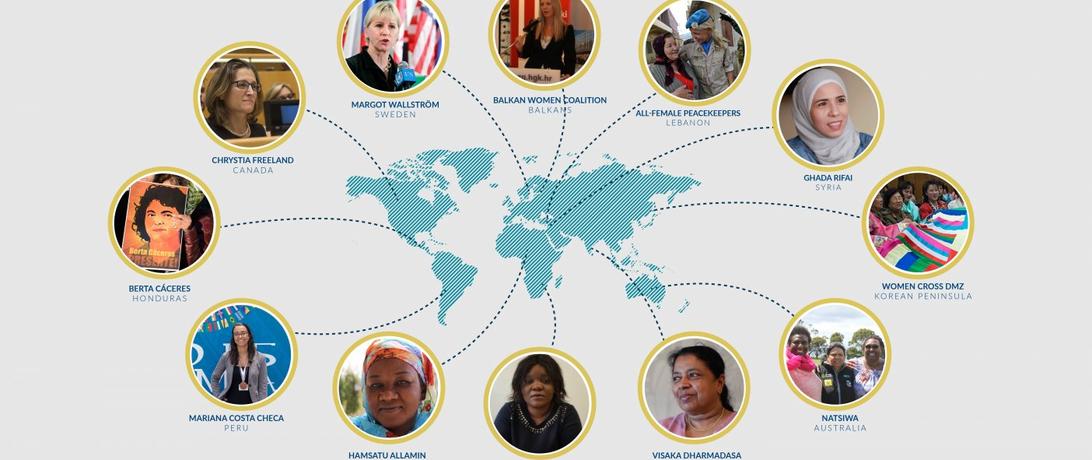
For International Women’s Day, Our Secure Future highlights the work of women peacebuilders around the world.
In 2015, Elle Magazine began their #MoreWomen Campaign, to highlight the absence of women from international leadership and decision-making bodies by photoshopping men out of historical photos. This movement picked up steam as feminists around the world continued to ask, “Where are all the women?” Certainly, there is a lack of female participation in the upper echelons of global leadership, which is an obstacle the Women, Peace and Security agenda strives to overcome. In honor of International Women’s Day, we think it is important to highlight the meaningful work that women are already doing. We dedicate this map to the successes of women changemakers around the world.
Africa
Zimbabwe
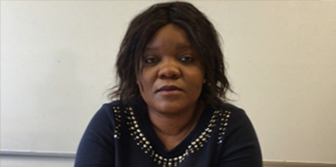 Edinah Masanga is an Impact Leader of World Pulse and founder of the Women’s Empowerment Foundation of Southern Africa (WEFSA), an organization that challenges disempowering myths and stereotypes about women.
Edinah Masanga is an Impact Leader of World Pulse and founder of the Women’s Empowerment Foundation of Southern Africa (WEFSA), an organization that challenges disempowering myths and stereotypes about women.
“Too often, media portrayals of women reinforce disempowering stereotypes,” Edinah says. “They send the message that the most important aspect of a woman is her physical appearance, or that she must be passive and helpless. Women are not often portrayed as ambitious, intellectual, independent or accomplished. I am determined to change this.”
Nigeria
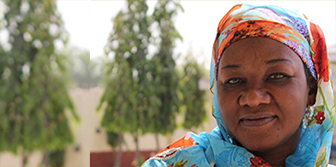 Hamsatu Allamin is a member of the global Women’s Alliance for Security (WASL) and the Federation for Muslim Women in Nigeria and the founder of the Allamin Foundation for Peace and Development. She created this organization to challenge the influence of Boko Haram in Nigerian communities, showing that education is an integral part of Islam, that all people have a right to learn, and that peace is attainable through dialogue.
Hamsatu Allamin is a member of the global Women’s Alliance for Security (WASL) and the Federation for Muslim Women in Nigeria and the founder of the Allamin Foundation for Peace and Development. She created this organization to challenge the influence of Boko Haram in Nigerian communities, showing that education is an integral part of Islam, that all people have a right to learn, and that peace is attainable through dialogue.
Asia
Korean Peninsula
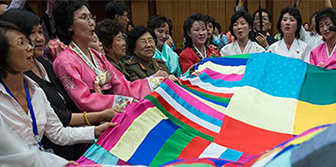 Women Cross DMZ, founded by Christine Ahn, is a network of women peacemakers calling for an end to the Korean War, reunification of Korean families, and women’s active participation in peace processes. In May of 2015, they organized a march for thousands of women from both North and South Korea that successfully crossed the 2-mile wide De-Militarized Zone between the two states. The organization described the march as a “symbolic act of peace.” More recently, Woman Cross DMZ orchestrated the Vancouver Women’s Forum to urge foreign ministers, who were gathered to discuss the stability of the Korean Peninsula, to engage in a diplomatic peace process.
Women Cross DMZ, founded by Christine Ahn, is a network of women peacemakers calling for an end to the Korean War, reunification of Korean families, and women’s active participation in peace processes. In May of 2015, they organized a march for thousands of women from both North and South Korea that successfully crossed the 2-mile wide De-Militarized Zone between the two states. The organization described the march as a “symbolic act of peace.” More recently, Woman Cross DMZ orchestrated the Vancouver Women’s Forum to urge foreign ministers, who were gathered to discuss the stability of the Korean Peninsula, to engage in a diplomatic peace process.
Sri Lanka
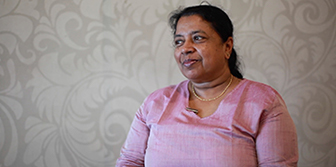 Visaka Dharmadasa is a member of WASL, a participant of Designing Our Secure Future, and the founder of the Association of War Affected Women. Her work in peacebuilding has many successes, including leading a delegation of mothers with missing servicemen sons to negotiate with guerillas. Her efforts led to successful negotiations and a ceasefire between the government of Sri Lanka and the Liberation Tigers of Tamil Eelam in 2000. Our Secure Future had the opportunity to speak with this tremendous woman in 2017.
Visaka Dharmadasa is a member of WASL, a participant of Designing Our Secure Future, and the founder of the Association of War Affected Women. Her work in peacebuilding has many successes, including leading a delegation of mothers with missing servicemen sons to negotiate with guerillas. Her efforts led to successful negotiations and a ceasefire between the government of Sri Lanka and the Liberation Tigers of Tamil Eelam in 2000. Our Secure Future had the opportunity to speak with this tremendous woman in 2017.
Australia
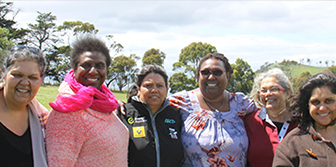 National Aboriginal and Torres Strait Islander Women’s Alliance (NATSIWA) strives “to protect the health, human rights, and fundamental freedoms that are significant to Aboriginal and Torres Strait Islander women through cultural preservation, health education and coalition building.” The organization aims to reduce violence and advance their well-being by securing their economic, political, social, educational, cultural, and environmental rights.
National Aboriginal and Torres Strait Islander Women’s Alliance (NATSIWA) strives “to protect the health, human rights, and fundamental freedoms that are significant to Aboriginal and Torres Strait Islander women through cultural preservation, health education and coalition building.” The organization aims to reduce violence and advance their well-being by securing their economic, political, social, educational, cultural, and environmental rights.
Europe
Sweden
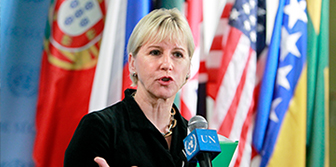 Margot Wallström currently serves as Sweden’s Foreign Minister. She is accredited with introducing a feminist foreign policy that places gender equality at the heart of Sweden’s international relations. Prior to her service as Foreign Minister, she served as the United Nation Special Representative for Sexual Violence in Conflict, dedicating her career to aiding women affected by sexual violence in Congo and Sierra Leone.
Margot Wallström currently serves as Sweden’s Foreign Minister. She is accredited with introducing a feminist foreign policy that places gender equality at the heart of Sweden’s international relations. Prior to her service as Foreign Minister, she served as the United Nation Special Representative for Sexual Violence in Conflict, dedicating her career to aiding women affected by sexual violence in Congo and Sierra Leone.
The Balkans
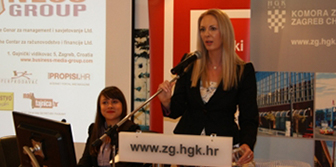 Balkan Women Coalition (B-WCo) is a multinational network for the advancement of women in the field of business. B-WCo operates with the assistance of partner organizations in Greece, Romania, Croatia, the former Yugoslav Republic of Macedonia, Serbia, Albania, Bulgaria, and Turkey. The coalition provides learning experiences and seminars to help develop the qualifications of women in business to boost their economic wellbeing.
Balkan Women Coalition (B-WCo) is a multinational network for the advancement of women in the field of business. B-WCo operates with the assistance of partner organizations in Greece, Romania, Croatia, the former Yugoslav Republic of Macedonia, Serbia, Albania, Bulgaria, and Turkey. The coalition provides learning experiences and seminars to help develop the qualifications of women in business to boost their economic wellbeing.
Latin America
Peru
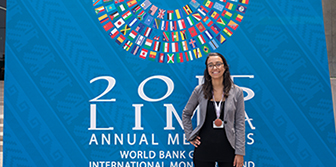 Mariana Costa Checa was named one of the most innovative people in Peru under 35. Checa is the co-founder and CEO of Laboratoria, a business that provides training and educational opportunities in tech for young, low-income women. Her company boasts a 75 percent employment rate after graduation and a 300 percent increase in their incomes.
Mariana Costa Checa was named one of the most innovative people in Peru under 35. Checa is the co-founder and CEO of Laboratoria, a business that provides training and educational opportunities in tech for young, low-income women. Her company boasts a 75 percent employment rate after graduation and a 300 percent increase in their incomes.
Honduras
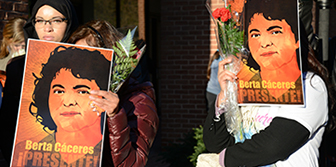 Berta Cáceres & Justice for Berta activist Berta Cáceres was assassinated in her home on March 2nd, 2016, after dedicating her life to protesting transnational corporation and government transgressions against the territorial land rights of the Lenca Indigenous People. Her movement did not stop without her. After her assassination, the Justice for Berta campaign took up the fight for indigenous Honduran land rights and advocated for her murder to be investigated.
Berta Cáceres & Justice for Berta activist Berta Cáceres was assassinated in her home on March 2nd, 2016, after dedicating her life to protesting transnational corporation and government transgressions against the territorial land rights of the Lenca Indigenous People. Her movement did not stop without her. After her assassination, the Justice for Berta campaign took up the fight for indigenous Honduran land rights and advocated for her murder to be investigated.
Middle East
Syria
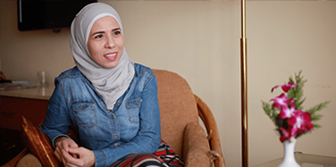 Ghada Rifai is an architect who used her skills to design the Mobaderoon Network. Initially it was Mobaderoon’s goal to promote active citizenship. However, after violence broke out in Syria, the network transformed itself into a critical tool for addressing conflict through dialogue and negotiation. It is a common space for participants to come together across political, sectoral, or ethnic differences.
Ghada Rifai is an architect who used her skills to design the Mobaderoon Network. Initially it was Mobaderoon’s goal to promote active citizenship. However, after violence broke out in Syria, the network transformed itself into a critical tool for addressing conflict through dialogue and negotiation. It is a common space for participants to come together across political, sectoral, or ethnic differences.
Lebanon
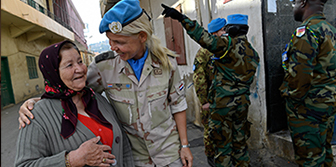 The United Nations Interim Force in Lebanon (UNIFIL) conducted its first all-female peacekeeping foot patrol in Rmeish in December 2017. The group was comprised of members from all over the world and quickly saw success in the ways that they engaged with local women and the community. Upon seeing how effective female peacekeepers can be, UNIFIL Head of Mission and Force Commander Major General Michael Berry publically stated that he would like to increase the practice amongst his forces, becoming a male champion of women in peacekeeping.
The United Nations Interim Force in Lebanon (UNIFIL) conducted its first all-female peacekeeping foot patrol in Rmeish in December 2017. The group was comprised of members from all over the world and quickly saw success in the ways that they engaged with local women and the community. Upon seeing how effective female peacekeepers can be, UNIFIL Head of Mission and Force Commander Major General Michael Berry publically stated that he would like to increase the practice amongst his forces, becoming a male champion of women in peacekeeping.
North America
Canada
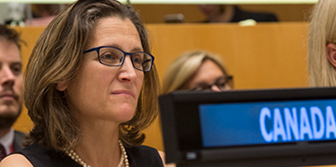 Chrystia Freeland, Canada’s Foreign Minister, is behind the country’s new feminist foreign policy, which emphasizes gender equality and the empowerment of women and girls. She also drafted Canada’s second National Action Plan on Women, Peace and Security.
Chrystia Freeland, Canada’s Foreign Minister, is behind the country’s new feminist foreign policy, which emphasizes gender equality and the empowerment of women and girls. She also drafted Canada’s second National Action Plan on Women, Peace and Security.
Who are some of the other women that belong on this list? Let us know on Twitter with @OurSecureFuture #HereAreAlltheWomen!
Photo credits:
Edinah Masanga-by WEFSA; Visaka Dharmadasa-by WASL; Ghada Rafai-WASL; Margot Wallstrom-by UN Photo, Rick Bajornas; Mariana Costa Checa-by Reuniones Anuales GBM, FMI Lima; Protesters for Berta Caceres- by Comisión Interamericana de Derechos Humanos; UNIFIL's first all-female female peacekeeper foot patrol in Lebanon- by UN Photo, Pascual Gorriz; Women Cross the DMZ; NATISWA by natiswa.org; Balkan Women's Coalition via balkanwomenscoalition.com; Chrystia Freeland-by UN Photo, Cia Pak; Hamatsu Allamin- by ICAN/WASL.